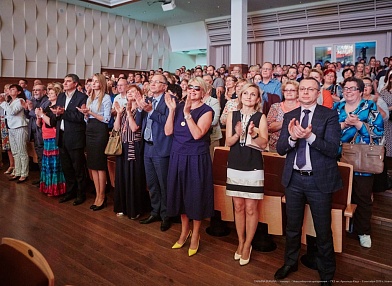Standing ovation, presentation of the Choir Chapel and performing of cantata "Carmina Burana": 80th concert season was opened in Novosibirsk Philharmonic

Novosibirsk Philharmonic opened its 80th concert season with the performing of monumental cantata by Carl Orff "Carmina Burana" on 8th of September. In the evening of season opening a new Philharmonic collective – Novosibirsk Choir Chapel conducted by Igor Yudin came to the stage of Arnold Kats State Concert Hall for the first time. The opening of the season was held at the crowded hall, at the end the audience applauded the musicians standing.
On 8th September Carl Orff’s scenic cantata “Carmina Burana” sounded on the concert-opening of Novosibirsk Philharmonic 80th concert season and it was performed by Novosibirsk Philharmonic Orchestra, Novosibirsk Choir Chapel, Choir of Children's Music School № 2. Soloists were Tatiana Kostina (soprano), Vyacheslav Vorobyev (tenor, Moscow), Pawel Jankowski (baritone). Conductor was Gintaras Rinkevicius, artistic director and chief conductor of Novosibirsk Philharmonic Orchestra.
“Not all of the score could be performed by chamber consist, we had to engage people from outside, but it is always expensive, we also had to educate and train them. And now we have a base of more than 60 professional singers who are worth 130 of western ones - said Igor Yudin, artistic director of the Novosibirsk Philharmonic’s Choir Chapel. - We were going to this for more than ten years, and I am happy that the story had a happy ending thank to strong-willed decision of Tatiana Lyudmilina, General Director of Philharmonic. I think that with the appearance of Choir Chapel Novosibirsk citizens would feel the expansion of Philharmonic repertoire and show new interest in the concerts”.
The cantata “Carmina Burana” was created by Carl Orf in 1935-36 on the basis of his own libretto based on medieval poems from the collection called Carmina Burana. It translates as "Song of Beuern" – on behalf of the Benedictine monastery where the original manuscript collection («Codex Buranus») was found in 1803.
The concert on 8th September opened not only the season, but also a series of concerts, which are dedicated to the 80th concert season of the Philharmonic. "Every collective in this dispersed cycle stands in the tradition of "Best of the previous years", and perform something well learned, - said Vladimir Kaluzhsky, artistic director of Novosibirsk Philharmonic - The final concert of the cycle will take place on Philharmonic’s Birthday – it will take place on 10th of February, the leading role in it will be played by Novosibirsk Philharmonic orchestra”.
During the season Novosibirsk Philharmonic will hold a number of festivals. Tatiana Lyudmilina, general director of Novosibirsk State Philharmonic Society, emphasizes that despite living through not the most prosperous times, Philharmonic didn’t abandon any festival. In October, there will be held the main jazz event of the year - an international festival SibJazzFest, the festival "Classica" will be held in December, where Moscow Chamber Orchestra Musica Viva conducted by Alexander Rudin will perform among other collectives. In March there will be held the traditional festival of contemporary music "March Code" in April – Trans-Siberian Art Festival of Vadim Repin.
In the new concert season Novosibirsk Orchestra of Russian Folk Instruments will celebrate its 90th anniversary; Filarmonica-Quartet will celebrate its 25 anniversary on 23rd of September; on 30th of September the soloist of Pavel Sharomov Vocal Ensemble Elena Zabarskaya will also celebrate 25th anniversary of her creative activity.
The new season Novosibirsk Philharmonic will hold in new acoustic conditions. During Summer 31 acoustic panels (13 - on the front edge of the stage, 18 - on the first rows of the orchestra) were installed on the ceiling, - says Tatiana Lyudmilina. - Now everything needed and possible is done and with proper setting our main concert hall can sound at the level of the best European halls – this is an expert’s opinion. A high opinion of acoustic characteristics was given by Pavel Lavrenenkov, sound-engineer of Moscow Philharmonic; what’s more valuable is that the specialist had the possibility to compare the conditions of the hall before the final stages of work on improving the acoustics and after them. We appreciate his words a lot and are confident that our audience will appreciate the positive changes that have costed us considerable efforts”.

